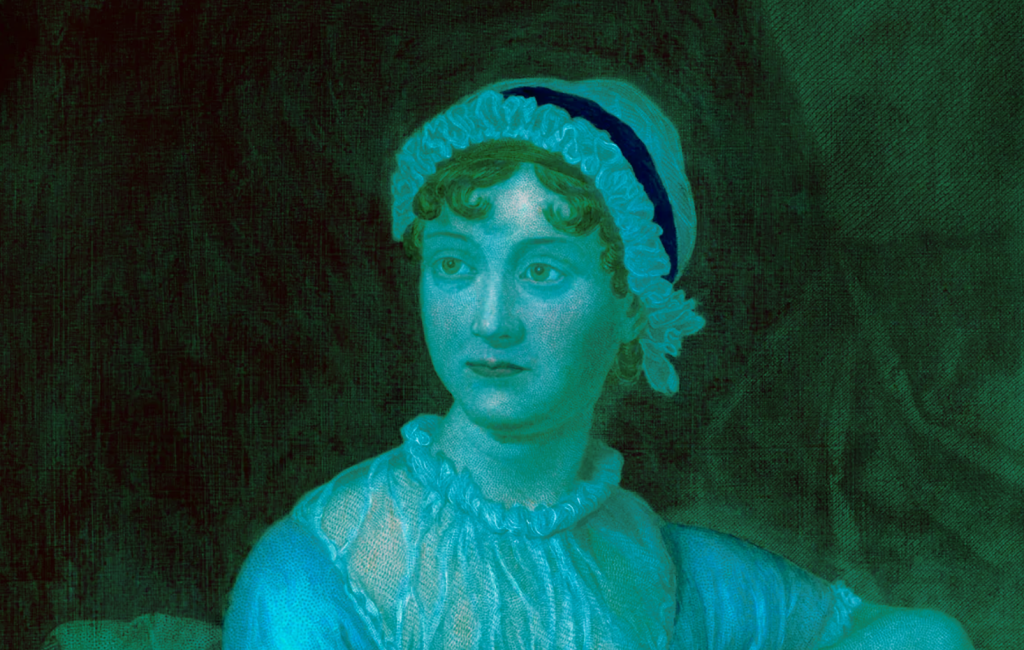

All you need is love?
Jane Austen’s Darkness by Julia Yost. Wiseblood Books, 2024. 86 pp., $8.00
Hate is bad. Minnesota governor and failed vice-presidential candidate Tim Walz declared during the 2024 presidential campaign that there is “no guarantee to free speech on . . . hate speech.” Meanwhile the nation’s most successful entertainment company, the National Football League, allows players to wear helmets emblazoned with the motto “Stop Hate” and is behind a campaign to stop antisemitism, “Timeout Against Hate.”
Hate is often juxtaposed with love. The NFL wants to “Stop Hate” while also encouraging us to “Choose Love.” Still, hate and love are not emotions but dispositions towards something. To love something is to recognize its value. To hate it is to deny its value, to declare that there is nothing loveable in it. That’s why Christians may reasonably say that we hate sin. If sin is separation from God, there is nothing good in it, and it is therefore hateful. We can hate actions but not people, for to hate a person is to say that person has no value, and no one created in the image of God is worthless.
So is it wrong to hate? This question occurred to me after reading Julia Yost’s slim volume, Jane Austen’s Darkness. Yost, senior editor at First Things, has written a brief extended essay combatting the stereotypical sunny interpretation of Austen’s body of work. Because Austen writes romantic fiction, and because her stories typically focus on a small number of leisured families in the English countryside, it is tempting to see them as the higher quality cousins of Hallmark movies. But Yost wants her readers to see a darker side of Austen. There is an edge to Austen, Yost claims, that is far more critical of her characters—even her heroes and heroines—than meets the eye. Yost’s Austen fixates on hate.
Yost is on to something here, yet I think she misses the boat somewhat on Austen. There is a kind of contempt in Yost’s book that is foreign to Austen. One needn’t take a pollyannish or simplistic approach to Austen’s work to see that Austen deals with human foibles with a lighter touch, more often resorting to humor than bitter recrimination.
In her discussion of Sense and Sensibility, for example, Yost revels in her disapproval of Edward Ferrars and Colonel Brandon. Edward, in Yost’s reading, is a “mediocrity” and an “unambitious nullity.” Similarly, Yost adopts the immature Marianne Dashwood’s estimation of Brandon as a boring old fuddy-duddy, certainly unworthy of the vivacious Marianne. After all, he favors flannel clothing. Thus both Marianne and Elinor Dashwood marry beneath themselves. This, Yost argues, should temper our estimation of the Dashwoods, especially Elinor whom most readers esteem for her good sense. Yet would someone of good sense marry a dullard like Edward Ferrars?
But Yost has misread Edward and, it should be said, the entire novel. Yes, Edward is an imperfect man. Edward is a man of leisure who by his own admission hasn’t used his leisure well. Perhaps his lack of intellectual rigor is what makes him an easy mark for Lucy Steele. Still, Edward, like Marianne at novel’s end, at least seems aware of his deficiencies and makes some effort to correct them. Elinor says of the man she will eventually marry, “I have seen a great deal of him, have studied his sentiments and heard his opinion on subjects of literature and taste; and, upon the whole, I venture to pronounce that his mind is well informed, his enjoyment of books exceedingly great, his imagination lively, his observation just and correct, and his taste delicate and pure.”
Two characters in Sense and Sensibility, Edward and Marianne, learn from their deficiencies and seek to improve. The two characters who represent good sense and virtuous character, Elinor and Brandon, see their constancy rewarded.
Yost likewise misreads Mansfield Park. It is no less a figure than Alasdair MacIntyre who contends that the fundamental theme of Austen’s novels is the virtue of constancy. Nowhere is this more definitively illustrated than in Mansfield Park.
Mansfield Park’s heroine, Fanny Price, is often derided as the least compelling Austen heroine. She is quiet and unassuming. It is easy to dismiss her as a wallflower, a mediocrity like Edward Ferrars. Drawing on Edward Said’s post-colonial emphasis on slavery, Yost’s Fanny is deferential to authority to the point of exhibiting a “slave morality.” One cannot help but notice that Yost’s description of Fanny is Nietzsche’s description of Christianity applied to what may be Austen’s most Christian novel.
Fanny is an exemplar of Christian morality. She thinks of others first. She has respect for legitimate authority. She has a strong sense of propriety and reverence, an almost preternatural goodness.
The famous plotline revolving around the young people putting on a play illustrates the point. The problem with the play is not just that the master of the house, the absent Sir Thomas, would disapprove, although that’s true. The problem is that acting itself is a morally problematic exercise. What are we to make of people who can easily assume any form of character, who can be hero or villain, lover or louse, appear courageous or cowardly, all at the drop of a hat? Such a person is likely one of weak, inconstant character. To pretend to be someone one is not, especially a bad character, is itself a sign of moral weakness. The enthusiasm with which the Crawfords embrace the play is a sign of things to come. Fanny’s refusal to act is an indication that she does not wish to play the game of being someone she is not. What may seem like good fun may also reveal serious moral deficiencies.
Fanny is a good Christian whose favorite necklace has a cross. She is a model of piety who is mortified by Mary Crawford’s open impiety. She is “too angry for speech” at Mary’s endorsement of the idea of skipping chapel service for a mere ten more minutes of sleep. Mary attempts to persuade Fanny’s eventual husband, Edmund, from joining the clergy, as that is an excessively dull profession in Mary’s mind. In Austen’s description, Mary “had none of Fanny’s delicacy of taste, of mind, of feeling; she saw nature, inanimate nature, with little observation; her attention was all for men and women, her talents for the light and lively.”
Yost describes Fanny’s rejection of the morally compromised Henry Crawford for the “spiritless” Edmund as “morally or even psychologically” unnecessary. But this misses the point. Henry Crawford is enamored with Fanny today, but what about tomorrow? Again, the novel demonstrates repeatedly Henry’s inconstancy. Fanny is aware of his poor character, so her rejection of him is morally necessary.
These are examples of problems I see in Yost’s book. But there is something intriguing in her overall project. Yost appreciates Austen’s most famous couple, Elizabeth Bennet and Mr. Darcy from Pride and Prejudice, precisely because they are “good hater[s].” Perhaps this is the result of their superior (but not perfect) ability to spot vice and their lack of patience with it. While I think Elizabeth’s lively sense of humor belies her as a “good hater,” one can see some justice in Yost’s conclusions.
Still, I think this is the essential problem with the book. Yost must discuss what she means by hate. There is something incongruous about naming Austen a novelist of hate. Given the pejorative connotations of this term today, to wield it as Yost does regarding an author not typically associated with that disposition requires some explanation.
Despite my concerns over the misreading of Austen’s works, Yost’s book serves as a valuable corrective to our egalitarian age. Our present denunciation of hate is likely the result of a lazy egalitarianism that cannot abide moral distinctions—the notion that some actions are better than others. If some actions are better than others, then those who more regularly perform those good actions are more virtuous than others. Any notion of moral excellence, with the concomitant possibility of moral failure, is anathema to those who seek to eradicate all distinctions and tear down any institution that dares to judge.
One thing we can say about Austen is that she is not afraid to judge. Lydia Bennet is a fool, and her husband, Mr. Wickham, is a despicable man. Perhaps we should hate the way they pursue marriage and their arrogant parading around of their immorality. Perhaps in Persuasion we should hate the schemes of Mr. Elliot to weasel his way into the greater Elliot family and gain a baronetcy. Hate, directed toward vicious actions, far from being a condemnable disposition might be a sign of a working moral compass.
This leaves me confounded by Yost’s work. Ultimately, I recommend the book. It has done something that a good book should do; it has made me think. And what is more, it has made me rethink. That is high praise indeed.
Jon D. Schaff of Professor of Political Science at Northern State University in Aberdeen, South Dakota. He’s the author of Abraham Lincoln’s Statesmanship and the Limits of Liberal Democracy and co-author of Age of Anxiety: Meaning, Identity, and Politics in 21st Century Film and Literature.